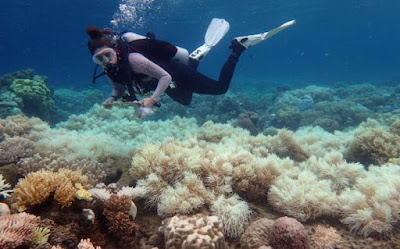Countries from Egypt to Mexico could lose 95 percent of their income from coral reef tourism, and parts of West Africa could see their ocean fisheries decline by 85 percent by the turn of the century if planet-warming emissions continue to rise, oceans experts warned Friday.
"Action in reducing emissions really needs to be taken, or we will be facing very important impacts" on oceans and people, said Elena Ojea, one of the authors of a new paper looking at the potential impacts of climate change on ocean economies.
The study, released at the UN climate negotiations in Madrid, was commissioned by the leaders of 14 countries with ocean-dependent economies, and looked at ocean fisheries and seafood cultivation industries, and coral reef tourism.
It found that reef tourism, a nearly $36-billion-a-year industry today, could see more than 90% losses globally by 2100 under a high-emissions scenario.
Countries particularly dependent on coral reef tourism - Egypt, Indonesia, Mexico, Thailand and Australia - could see income cut by 95 percent, the paper noted.
Ove Hoegh-Guldberg, an ocean expert at Australia's University of Queensland and one of paper's authors, said his country's Great Barrier Reef tourism industry - worth billions a year a year - was already seeing losses as corals bleached and died.
Ojea, of Spain's University of Vigo, said the 30 million people directly employed in ocean fishing each year also "will be heavily affected" as fish struggle with hotter and more acidic oceans and move to new ranges or die.
"Action in reducing emissions really needs to be taken, or we will be facing very important impacts" on oceans and people, said Elena Ojea, one of the authors of a new paper looking at the potential impacts of climate change on ocean economies.
The study, released at the UN climate negotiations in Madrid, was commissioned by the leaders of 14 countries with ocean-dependent economies, and looked at ocean fisheries and seafood cultivation industries, and coral reef tourism.
It found that reef tourism, a nearly $36-billion-a-year industry today, could see more than 90% losses globally by 2100 under a high-emissions scenario.
Countries particularly dependent on coral reef tourism - Egypt, Indonesia, Mexico, Thailand and Australia - could see income cut by 95 percent, the paper noted.
Ove Hoegh-Guldberg, an ocean expert at Australia's University of Queensland and one of paper's authors, said his country's Great Barrier Reef tourism industry - worth billions a year a year - was already seeing losses as corals bleached and died.
Ojea, of Spain's University of Vigo, said the 30 million people directly employed in ocean fishing each year also "will be heavily affected" as fish struggle with hotter and more acidic oceans and move to new ranges or die.
She said the problem was most serious in equatorial regions, with some West African nations, in particular, facing "very huge losses" by the end of the century if emissions rise well beyond the 2 degree Celsius limit set in the 2015 Paris Agreement.
But some cooler areas of the planet could see a rise in local fish stocks as fish move to cooler waters, she said.
Efforts to adapt fisheries to changing conditions and better manage them, alongside stronger efforts to curb climate change, could cut expected losses, however, said Timothy Fitzgerald, director of the US-based Environmental Defense Fund's Fishery Solutions Center.
"We know the most well-managed fisheries are also the most resilient to climate change," he told journalists at an event on the sidelines of the UN talks.
Vidar Helgesen, Norway's special envoy to the 14-nation High-Level Panel for a Sustainable Ocean Economy, said the paper should send a "very strong message to the world" on the need to act swiftly to prevent growing ocean-related losses.
The report builds on the Intergovernmental Panel on Climate Change's findings that climate-related damage to oceans is likely to cost the global economy nearly $430 billion by 2050, and close to $2 trillion by 2100.
But some cooler areas of the planet could see a rise in local fish stocks as fish move to cooler waters, she said.
Efforts to adapt fisheries to changing conditions and better manage them, alongside stronger efforts to curb climate change, could cut expected losses, however, said Timothy Fitzgerald, director of the US-based Environmental Defense Fund's Fishery Solutions Center.
"We know the most well-managed fisheries are also the most resilient to climate change," he told journalists at an event on the sidelines of the UN talks.
Vidar Helgesen, Norway's special envoy to the 14-nation High-Level Panel for a Sustainable Ocean Economy, said the paper should send a "very strong message to the world" on the need to act swiftly to prevent growing ocean-related losses.
The report builds on the Intergovernmental Panel on Climate Change's findings that climate-related damage to oceans is likely to cost the global economy nearly $430 billion by 2050, and close to $2 trillion by 2100.
Source - TheJakartaPost

